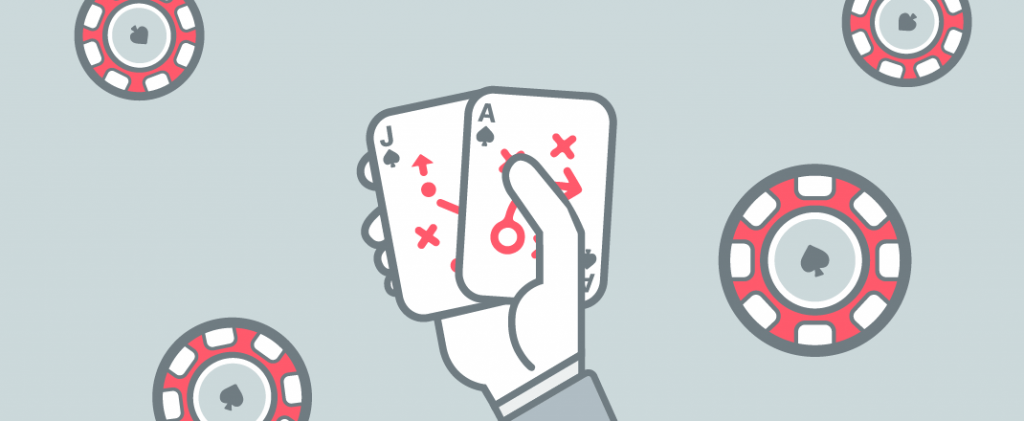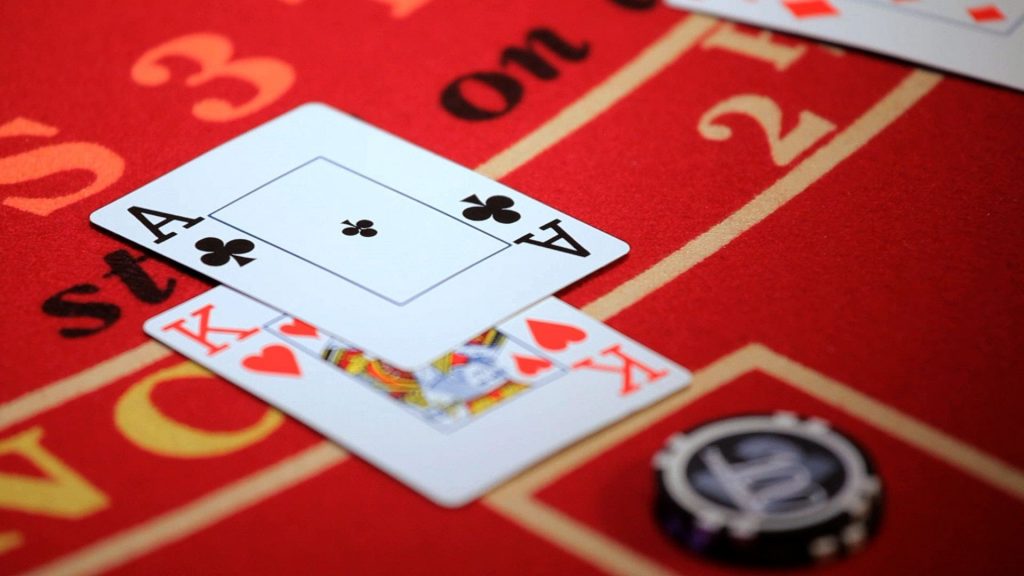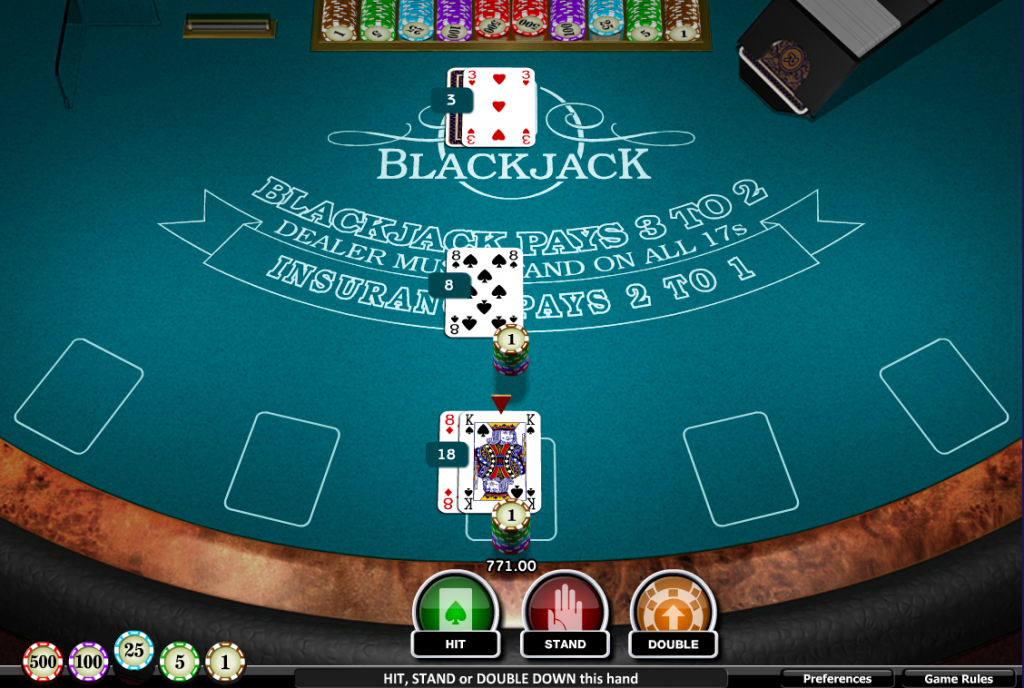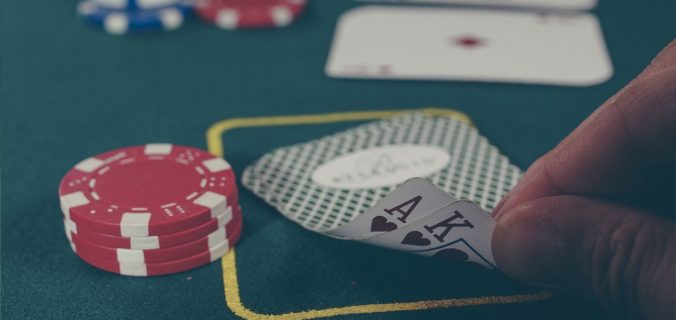Also called TWENTY-ONE, VINGT-ET-UN, VAN JOHN and PONTOON, Blackjack is by far the most popular casino card game. Playing against the house (casino), the object of the game is to beat the dealer’s hand without going over 21.
Each card has a specific numeric value. Cards from 2 to 10 are worth face value. Face cards (Jack, Queen, King) are valued at 10. Aces are worth 1 or 11, at the player’s discretion. Suits, such as clubs or hearts, have no significance in Blackjack.
A hand is valued by adding the numeric value of each card. For example, a hand with Q, 6, 3 would be worth 19.
The highest hand is called a Blackjack, which is composed of two cards that total exactly 21 (an Ace with a Ten, Jack, Queen, or King.) A Blackjack beats any other hand except for another Blackjack.
Any other hand containing an Ace is considered to be a “soft” hand. For example, a hand containing a Six and an Ace might be valued as either 7 or 17. If counting the Ace as an 11 would put the hand over 21, the Ace will be automatically counted as a 1 instead.
A hand that goes over 21 is called a “bust” and is an automatic loser.
You begin by placing a bet on the table. You will then receive two cards face up. The dealer will receive one card face up and one face down. The down card is called the “hole card” and will remain face down until you have completed your play.

If the dealer up card is an Ace, the insurance option will be offered. You may accept or decline this offer (see Insurance for details.) The dealer will then check for Blackjack (if the dealer’s up-card is a 10-value card, the dealer hand will be checked without revealing the hole card.) If the dealer has Blackjack, play ends and your wager is lost, unless your hand also contains a Blackjack (resulting in a “push” or tie).
If there is no dealer Blackjack and you have a Blackjack, the dealer will not take any hits. You automatically win $1.50 for every $1 of your original wager.
If no Blackjack is present, you must decide whether to keep your hand as is (“stand”), or take additional cards in an attempt to increase the value of your hand. The decision to take an additional card is called a “hit” or a “draw.” There is no limit to the number of hits you can take. If you “bust”, by going over 21 while taking a hit, you lose and play is over. When you are done taking hits, you must “stand” and await the results of the dealer’s hand.
Now it is the dealer’s turn. First, the “hole card” will be revealed. If the dealer’s hand totals 17 to 20, the dealer must stand. If the value is 16 or less, the dealer must take hits until the value of the hand is 17 or higher. If the dealer “busts” while taking additional cards, the dealer hand automatically loses.
If the value of your hand is closer to 21 than that of the dealer, you win an amount equal to your original bet. If the dealer’s hand is better, you lose your bet. If the hands are of equal value the deal is a push and your money is returned.

After each game has been played, the used cards are shuffled back into the deck.
Surrender
If, after viewing your original two cards and the dealer’s up card, you feel that your chances of winning the hand are not good, you will have the option to “surrender” the hand. If you choose to surrender, you will automatically lose half of your original wager; the other half will be returned to you. Play of the hand will cease, and the deck will be reshuffled.
NOTE: If the dealer was dealt a Blackjack, the “surrender” option will not be available.
Double Down If, after viewing your original two cards and the dealer’s up card, you feel that your chances of winning the hand are good you can choose to double the amount of your original wager. You will be dealt exactly one additional card and play will pass to the dealer.
Split
If you are dealt two cards of the same value (8-8, 6-6, 10-K, etc.), you may choose to split the cards into two separate hands. An additional wager equal to your original wager will be placed next to the additional hand.
A second card will be dealt to the first of the split hands. This hand will be played out, with all the normal options available (surrender, double down, etc.) When you have finished playing the first hand, the other split hand will then be dealt a second card and played out as usual.

NOTES: Only one split is allowed per deal. NOTES: A split-hand Blackjack will pay off at 1:1 instead of 3:2
Insurance
Whenever the dealer’s up card is an ace, the insurance option will be available. When you buy insurance, you are insuring yourself against the possibility that the dealer has a blackjack. Insurance is an additional wager equal to half of your original bet.
If the dealer has a Blackjack, the insurance will pay off at 2:1. Your original bet will be lost, unless you also have a Blackjack, in which case the hand will push.
If the dealer does not have a Blackjack, you will lose the insurance wager and the hand will be played out as usual.

